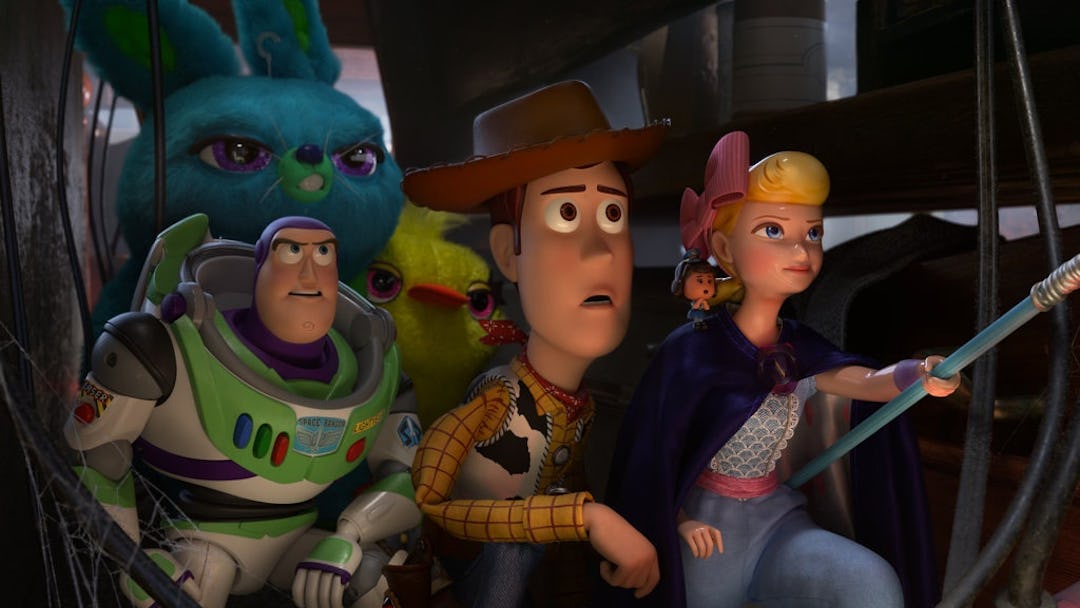This week’s big new disc releases are buzzy summer titles that couldn’t be further apart: the latest installment in a long-running family franchise, and a brutal slab of broad-daylight horror. Let’s take a look at those, and some catalogue titles that are well worth your disc and streaming trouble:
ON NETFLIX:
The Squid and the Whale: Presumably tied to the upcoming debut of his brilliant, Netflix-funded Marriage Story, the service has added writer/director Noah Baumbah’s earlier tale of divorce, this one the loosely autobiographical story of he separation of a pair of married writers and the damage it does to their sides-choosing sons. As the parents, Jeff Daniels and Laura Linney are brilliant, each playing a very specific kind of bad parent/difficult person; dad is a self-satisfied name-dropper who thinks the worst thing he can do is insult the intelligence of his romantic successors, while mom’s wry commentary is more subtle, but cuts deeper. Eldest son Jesse Eisenberg regurgitates his dad’s literary opinions (among other intellectual property); younger Owen Kline deals with the separation via a lot of public masturbation. It’s a tricky picture, with a tone that’s as hard to pinpoint as it is to catch wavering, and Baumbach, as ever, has a keen ear for the dialogue rhythms of insecure intelligentsia.
ON AMAZON PRIME:
High Life: There’s something sort of delicious about imagining the Robert Pattinson fans, diehards from his Twilight days, innocently clicking the play button on... this. It's a violent, disturbing, hyper-sexualized outer space drama from director Claire Denis, which begins with Pattinson and a baby all alone on a space station, and reveals the derailed prison experiment that put them there. The themes are grim and the images are unforgettable; it’s as uncompromising a work as one would expect from Denis, and that’s a high compliment indeed.
ON 4K / BLU-RAY / DVD / VOD:
Toy Story 4: Let’s get this out of the way: Toy Story 3 was such a perfect conclusion, such a deeply felt and emotional culmination of this special series, arriving at such a smooth and logical endpoint, that the mere idea of a fourth chapter is a little irritating – and the film itself doesn’t always convince the viewer of its need to exist. But that overarching complaint aside, there’s so much to like here: the reliably heart-warming work of Tom Hanks as Woody, the triumphant return of Annie Potts’s Bo Peep, the ingenious characterization of Forky, the way Christina Hendricks manages to be both entirely sympathetic and utterly terrifying, and most of all, the quality of Pixar’s animation, which still stuns, even after all these years. (Includes audio commentary, deleted scenes, featurettes, and trailers.)
ON BLU-RAY / DVD / VOD:
Midsommar: Hereditary director Ari Aster is back with another chamber piece about grief and doubt and fear, goosed along by the tropes and expectations of horror. This time, he tags along with a quartet of semi-ugly Americans, visiting a nine-day midsommar festival at a Swedish commune, full of pageantry and ceremony that takes a deeply disturbing turn. Florence Pugh is magnificent in the central role, crafting a portrayal of depression and trauma that feels as exposed as an open wound, while Jack Reynor is very good as her selfish prick boyfriend. Aster’s staging is effectively simple and quietly deliberate, lulling the viewer into complacency with beauty and humor, and then wielding violence and gore like a blunt instrument. He loses control of this tone a bit in the home stretch; there’s so much build-up, at such a slow, rolling boil, that the payoff feels somewhat lacking. But nevertheless, Midsommar is a firm confirmation that Aster is a major filmmaker.
ON BLU-RAY:
3 Silent Classics by Josef von Sternberg: Criterion put out this box set on DVD back in 2010, and the upgrade is worth it – these three dramas from the Austrian master, released in a brilliant burst in 1927 and 1928, are moody, gorgeous works. Underworld was one of the first gangster movies, and von Sternberg really was inventing the idiom here; the story beats would become familiar, as it’s a story of rivalries and murder and betrayal, but few nailed the themes of ego, jealousy, and machismo quite as well. The Last Command is like a double-feature in one – it stars as a Hollywood satire, with Emil Jannings as a former military man trying to break into movies, before flashing back to his own fall from grace. It’s a visceral, powerful picture, and Jannings is magnificent. But the best of the bunch is the subtlest: The Docks of New York is an earthy romance, set mostly in a waterfront bar, capturing the rough and tumble lives of a ship “stoker” and the women he comes to love. Much of it is rowdy and gregarious, but the tenderness of this relationship, especially in its closing scenes, is overwhelming. (Includes alternate scores, video essays, and archival interview.)
